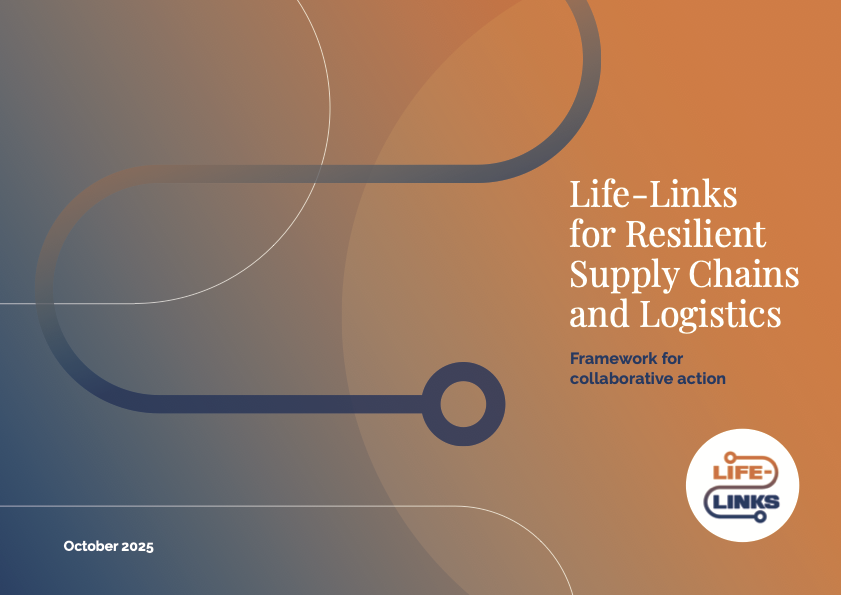Life-Links Framework unites Partners for Shared Resilience and Sustainable Supply Chains

Amsterdam, 13 October 2025. As climate disruptions and other shocks increasingly threaten global trade, Life-Links has brought together experts from academia, business, development, and civil society to co-develop “Life-Links for Resilient Supply Chains and Logistics – Framework for collaborative action.”
The report presents a practical, collaborative approach for strengthening the critical transport links – such as roads, railways, ports, and corridors – that keep supply chains moving yet remain largely overlooked in climate, risk-management, and investment plans. When these links fail, companies face costly disruptions, communities lose access to markets and income, and countries see trade and development slow – showing how shared vulnerabilities demand shared solutions.
Authored by Sophie Punte, Co-founder and CEO of Life-Links, the step-by-step framework guides companies, governments, development partners, and financiers to translate climate ambition into coordinated action. Stakeholders assess the risks of supply-chain disruption, identify solutions, and coordinate and co-invest in feasible actions that create value for communities, companies, countries, and consumers alike.
“Climate risks often surface first in logistics — when roads wash out, ports close, or temperature extremes disrupt supply chains,” said Sophie Punte. “Too often, companies treat supply-chain risk, climate adaptation, and emissions reduction as separate agendas, but that fragments the effort. The Life-Links Framework helps partners align these priorities: turning shared risks into shared resilience and empowering the local communities whose livelihoods and natural resources depend on supply chains.”
The Life-Links Framework responds to the growing recognition from experts that logistics resilience underpins both climate adaptation and business continuity. It offers a common structure and language for diverse actors to work together – aligning climate mitigation, adaptation, and finance within real-world trade systems. These issues, including closing the nearly USD 6 trillion annual global climate-finance gap, will feature prominently at the UN Climate Conference (COP30) in Brazil next month.
Alan McKinnon, Professor of Logistics at Kuehne Logistics University, noted: “Despite many years of research and consultancy on supply chain management, we have lacked a collaborative framework that can simultaneously increase climate resilience, cut carbon intensity, and enhance development potential. Life-Links fills this gap, offering practical and much-needed guidance to a broad range of stakeholders.”
Pietro D’Arpaß, former VP Supply Chain Logistics and End-to-End Strategic Planning at Procter & Gamble, stated “Building resilience is no longer just about securing one’s own supply chain. It’s about strengthening the shared links that connect us all. Companies create far greater value when they collaborate beyond their immediate partners, engaging logistics providers and local communities. The Life-Links Framework helps turn these wider partnerships into concrete, shared advantages for business and society.”
Mark Major, Senior Advisor to the Kuehne Climate Center and co-chair of the Life-Links Council, added: “No single company or country can build supply chain resilience alone – it needs collective effort. We’re testing the Life-Links playbook along coffee and avocado supply chains from East Africa to Europe, showing how investing in the ‘first mile’ benefits farmers, local transporters, exporters, retailers, consumers and communities.”
With 27% of global road and rail infrastructure and 86% of ports exposed to multiple natural hazards, the report underscores that coordinated investment in logistics resilience is both a climate imperative and a business opportunity.
“Resilient logistics are the foundation of resilient economies.” Punte concluded. “By strengthening the critical links that connect communities and markets, we connect climate goals to real-world impact.”
-
Download the Life-Links Framework
-
Like, comment and share the Framework on LinkedIn
-
Let us know what you think of the framework
About Life-Links
Life-Links is a global non-profit based in the Netherlands, co-founded in 2024 by the Kuehne Climate Center and CEO Sophie Punte. Its vision is that resilient supply chains can drive climate action and local sustainable development, benefiting communities, companies, countries, and consumers alike. Through its Life-Links Framework, supply chain actors are mobilized to co-develop and co-invest in solutions that make critical transport links more resilient, sustainable, and inclusive.